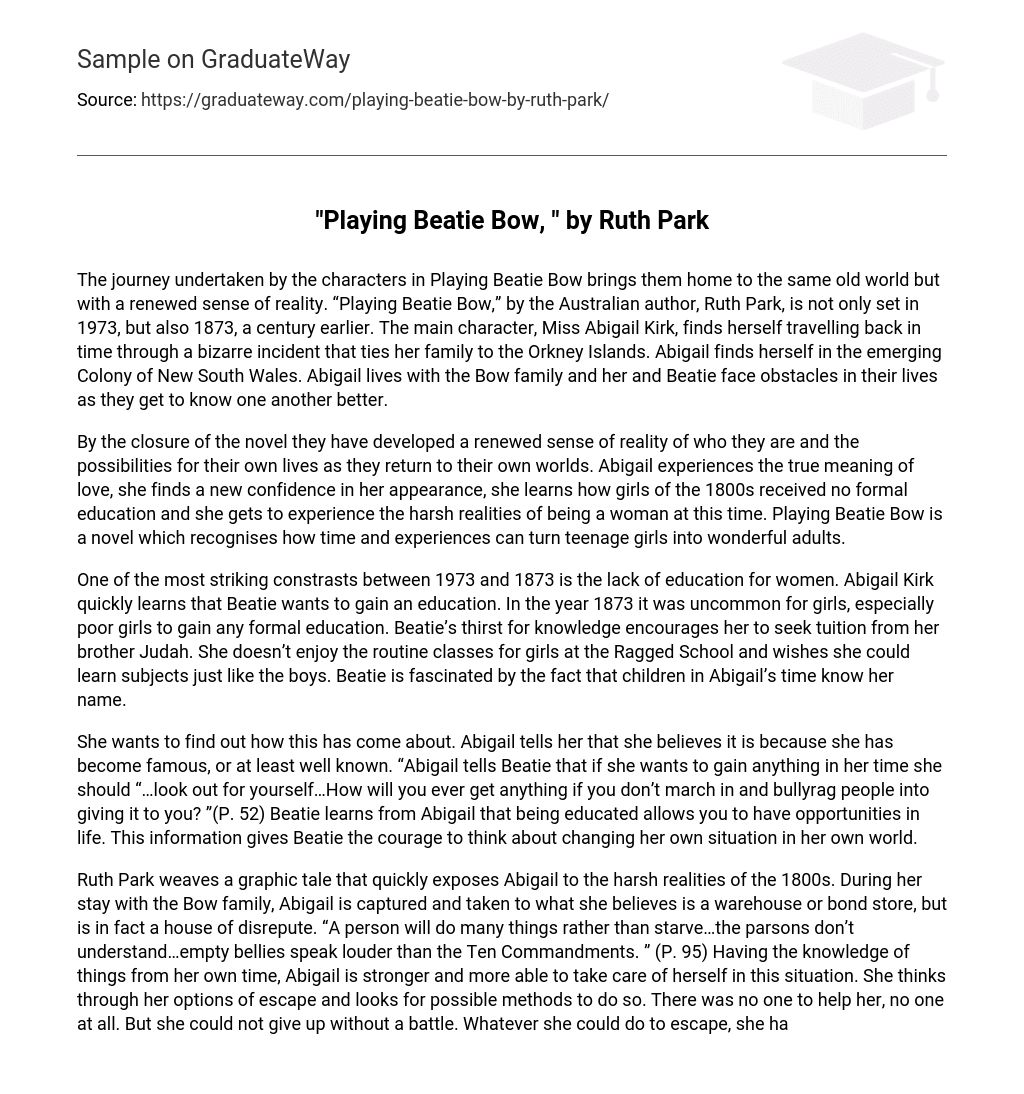In Playing Beatie Bow, the characters’ journey leads them back to their familiar world, but with a renewed understanding of reality. The novel, written by Ruth Park, is set in both 1973 and 1873. The protagonist, Miss Abigail Kirk, is transported through time after a strange incident that connects her family to the Orkney Islands. As she arrives in the developing Colony of New South Wales, Abigail resides with the Bow family and faces challenges alongside Beatie as they become more acquainted with one another.
The characters in Playing Beatie Bow undergo a transformation as they return to their own realities at the end of the novel. Abigail, for instance, gains a deeper understanding of love and becomes more confident in her physical appearance. She also educates herself about the limited opportunities for girls’ education in the 1800s and confronts the challenges faced by women during that time period. This story highlights how time and experiences can shape teenage girls into remarkable adults.
There is a stark contrast between 1973 and 1873 regarding education for women. Abigail Kirk discovers that Beatie desires to be educated. During 1873, it was rare for girls, particularly those from impoverished backgrounds, to receive any formal education. Beatie’s desire for knowledge motivates her to seek instruction from her brother Judah. She finds the typical girls’ classes at the Ragged School unenjoyable and hopes to study the same subjects as boys. Beatie is fascinated by the fact that children in Abigail’s era are aware of her name.
Abigail explains to Beatie that her newfound fame or recognition has led to her current situation. She advises Beatie to take care of herself and assertively demand what she wants, saying, “How will you ever get anything if you don’t march in and bullyrag people into giving it to you?” (P. 52) Beatie realizes from Abigail’s words that education opens doors to opportunities. This knowledge empowers Beatie to consider changing her own circumstances in her own sphere.
Ruth Park recounts a gripping tale that promptly exposes Abigail to the harsh realities of the 1800s. Abigail is seized and brought to what she assumes is a warehouse or bond store, but it reveals itself as a house of ill repute. Abigail comprehends that individuals will resort to anything to avoid hunger, even if it involves disregarding religious teachings. She draws upon her knowledge from her own era to navigate the predicament and seeks avenues for liberation. Despite lacking assistance, Abigail adamantly refuses to surrender without putting up a fight and employs every means at her disposal to liberate herself. With Judah and the boys’ support, she valiantly manages to escape the terrifying ordeal. The boys are astounded by her bravery, comparing her to an audacious young boy. Abigail’s self-reliance, which she fosters in others, empowers her with the resolve to attempt an emancipation.
Abigail exhibits bravery in challenging her own beliefs and expectations as she immerses herself in the world of the Bows. This encounter leads her to reconsider how harsh, ungrateful, and cruelly she has treated her parents. Upon returning to Old Sydney Towne, Abigail unexpectedly meets Judah, the man who did not reciprocate her affection, resulting in profound heartbreak. Nevertheless, under Granny Talisker’s wise guidance, Abigail realizes that true love entails granting loved ones the freedom to pursue happiness.
Abigail, despite her unchanged feelings for Judah, is able to embrace the truth and acknowledge her own immaturity and ignorance when it comes to matters of the heart, especially in relation to her parents’ relationship. She realizes that adult life is not a simple or straightforward journey, but rather one filled with complexities. As she returns from her journey into the past, Abigail experiences a profound transformation and adopts a new perspective on the world. The novel “Playing Beatie Bow” adeptly explores the intricacies of life, surpassing boundaries of time periods and social classes.
Abigail Kirk, the protagonist, is sent back to the late 1800s and resides as a member of a working-class family. Devoid of contemporary diversions, she grasps that connections with others hold greater value than material possessions. The manner in which we treat and engage with individuals reveals our genuine riches. Abigail comprehends that love adheres to its own whims regardless of the era, be it 1873 or 1973.





